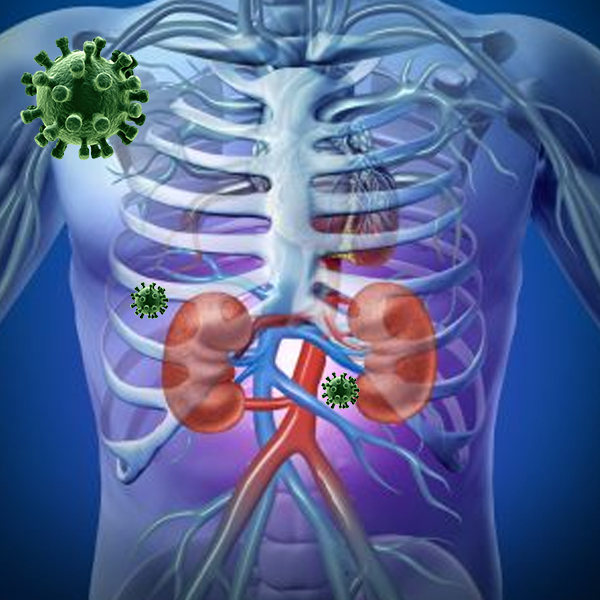
COVID 19 And Kidney: Everything You Should Know
By now you must have read that coronavirus is spread from person to person. Older adults and people with kidney diseases or other chronic medical conditions such as heart diseases or diabetes are at an increased risk for serious complications of coronavirus infection.
Know your symptoms
The most common symptoms are fever, cough, and trouble in breathing. Some patients may also experience sore throat, body aches, headaches, or chills.
What to do if I experience symptoms of COVID 19?
If you have a high temperature or a new continuous cough, then you should self-isolate for seven days if you live alone and for 14 days if you live with family members. All the family members should also self-quarantine themselves. In case you must contact your nephrologist, contact him/her over the phone first. If you are a dialysis patient and have developed symptoms of COVID 19, inform your dialysis unit and they will inform you about what should be done.
If the symptoms worsen during the quarantine, immediately contact emergency health services.
Why is it important for me to prepare for the outbreak?
In case of an outbreak in your community or area, it is important to stay home all the time. Hence you should have adequate supplies of food and essential and routine medications. It is important to have 2 to 3 weeks of healthy, kidney friendly foods, and fresh water. If there is any confusion regarding your medicines, contact your healthcare professional through phone.
Stay safe
Since kidney patients are at an increased risk, it is especially important for you to take extra steps to prevent exposure to coronavirus. There are several steps which you can follow to avoid exposure:
1. Stock up on supplies if you are at higher risk of getting affected by coronavirus
2. Follow daily precautions to ensure space between yourself and others
3. Follow social distancing when you go out in public, keep away from others who are sick, limit close contact
4. Frequently wash your hands
5. Avoid crowded areas as much as possible
6. If there is a coronavirus outbreak in your community or area, do not step out of the house
7. Follow government advisories and do not panic
Should I continue my dialysis and medical appointments?
Do NOT miss your treatments, if you are on dialysis. Contact your doctor immediately if you feel unwell. For other medical appointments, early stage kidney patients or transplant recipients, contact your nephrologist or healthcare team and share your concerns with them. Follow their advice.
How do I know I should isolate myself?
Kidney patients are high risk category, and should self-isolate themselves if you belong to one of these groups:
1. You have a transplant
2. You are on dialysis
3. If you are over 70 years of age and are on any form of immunosuppression
4. Your kidney disease is caused by inflammation, a condition of your kidneys AND you are in one or more of the following patient groups:
a. Currently receiving intravenous cyclophosphamide treatment or rituximab treatment or have done so within last 6 months
b. Receiving cyclophosphamide treatment as oral tablets
c. Received prednisolone at a dose equal to or above 20 mg tablets every day for more than 4 weeks any time within the last 6 months
d. Received or are currently receiving more than 5 mg every day of prednisolone for greater than 4 weeks taken with at least one other immunosuppressive type of medicine within the last 6 months
e. Suffer with nephrotic syndrome and are currently nephrotic or have had more than one nephrotic attach needing drug treatment during the last 6 months
If you are not sure about the medicines you take or the condition you have, contact your doctor and check with him.
Related FAQs
Everything You need to know about Outbreak of Novel Corona virus Infection in china
Coronavirus in India: Symptoms, Cases and Latest Updates
WHO declares Global Health Emergency -India’s first case of Coronavirus in Kerala
WHO Declares The Outbreak Of The Coronavirus As A Pandemic
COVID-19 or Coronavirus Declared as A Pandemic
Difference between Quarantine, Isolation and Social Distancing
101 With Hantavirus: Causes, Symptoms And Treatment
India Under Quarantine: Can It Block The Virus Progress?
British Prime Minister Boris Johnson Diagnosed with COVID 19
Can Coronavirus Risk Increase In Diabetic Patient
Diabetes and Coronavirus (COVID-19)
Coronavirus-Diabetics are more vulnerable By Dr. Manoj Chawla
Prevention from Coronavirus Infections
Coronavirus- Telemedicine for Diabetes patients
Coronavirus: Is India In Stage 3?
Should I Get Tested For Coronavirus?
COVID-19: The Impact On Human Immune System
COVID-19 in heart and Blood Pressure patient
COVID-19- Update for Heart and Blood Pressure patient
Coronavirus Pandemic: Current situation
Coronavirus And Skin Problems: Things You Must Know
COVID 19 And Kidney: Everything You Should Know
Corona Lockdown Extended To 3rd May 2020: Know Why
Covid-19: How To Stay Safe If You Have Diabetes
All That You Should Know About COVID-19 Or Coronavirus
Diabetes And Covid-19: Keep Calm And Stay Safe
Covid-19 Impact On Diabetes Patients: Things To Keep In Mind
Telemedicine: The Safest Mode Of Doctor-Patient Interaction During Covid-19
Everything you need to know about Russian Sputnik V Vaccine
Know the Difference Between Viral Fever and Coronavirus
New 'Double Mutant' Strain Of Covid-19 Detected In India
Will India See A Third Wave Of COVID -19?
Why is COVID Vaccination Important in India?
What are chances of Reinfection of COVID 19 in India ?
Are Children at Risk of Omicron?
Corona- Delta and Delta Plus Variants
Everything To Know About The Omicron Variant
Symptoms and Severity of Omicron: BA.4 and BA.5 | Medtalks
Another Milestone Reached: US Successfully Developers Covid Vaccine For Babies and Toddlers
Indian researchers find a new way to combat Covid-19
Covid-19 Infection Provides Protection against Reinfection for Roughly 10 Months
